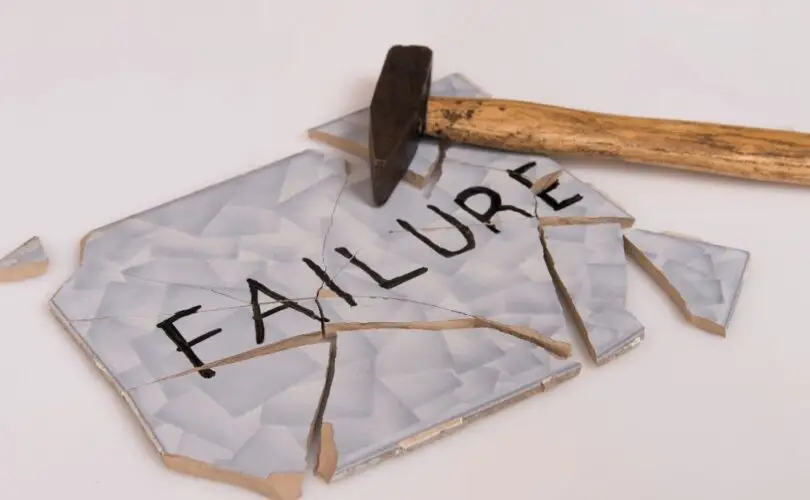In this article: How to pick yourself up after failure!
So many of us live in complete and utter terror at the prospect of failure. It’s difficult to imagine anything worse than falling flat on your face – is it the horrible feeling that comes with letting everyone down, the belief that everyone is standing by just waiting for you to fail, the feeling that everyone is laughing, or is it something different that fuels your fear of failure? Do you find yourself too terrified of failure to even put yourself out there? Does the thought of failing scare you so deeply you can’t face the prospect of even trying?
The truth of the matter is that we are all destined to fail at some point in our lives and guess what? That’s totally okay! We wouldn’t be human if we didn’t experience some type of failure. The most important aspect of failure, though, is in how we pick ourselves back up and live to fight another day. You certainly shouldn’t let the fear of failure prevent you from putting yourself out there and enjoying life.
When you come to the realization that you have failed then it’s time to engage damage limitation. Of course, how you limit the damage will entirely depend on what your failure was. It could be as simple as getting back on the bike after you fall off, apologizing for something you said in the heat of the moment, or resigning from a position that was never right for you. The key to bouncing back from failure is being proactive.
Everybody Fails Sometimes
The majority of people don’t really enjoy talking about their failures openly. They are happy to brag about the promotion they got, but they probably won’t tell you that it took months to come around, double the hours, and they would definitely never tell you how many times they got close and it never came to fruition. Before you can taste success… you will need to first taste failure. It’s only natural to fall down a multitude of times on your way to winning. Just ask the biggest successes in business and beyond.
There is no shame in failure because despite what you tell yourself, it doesn’t make you worthless, and it definitely doesn’t mean you won’t achieve everything you want. When you face failure, you should consider all of the times in your life that you have succeeded.
Sit down and make a list of every success you’ve tasted in life, whether it was a 4.0 GPA in college, a promotion that you worked really hard to get, learning a new language or winning a bake-off. Your listcanbeaslongorasshortasyouwantittobeand anytime you feel your confidence wobble you can look back on your list of accomplishments and know that this too shall pass.
Your failures are just as important to your story as your successes. The biggest reason is that because you can cast a glance back into the past and see your failures it is easier to realize that you overcame them. Sure, they were rough at the time, whether you got a poor exam result, got fired from a job, or went through a particularly rough breakup… you came out the other end and in one piece.
No one wants to look at all the times that life went wrong, but remembering a failure can remind you that this failure is no different from any others. You recovered then and you will again. That’s the nature of life, the secret to success, though, is in how you recover.
Often, following a failure, we find ourselves faced with making a decision. For example, you may have chosen to take out a credit card in order to make a large purchase. Unfortunately, you overused the card and now you are in debt. This counts as a failure, but the problem is you can’t cancel a card that you have a debt on. So, do you keep the card or do you cut it up and avoid ever using it again? Perhaps you made a major error at work and you aren’t sure whether you should look for a new job or stick it out at the old one. The key lies in making a thoughtful decision, rather than rushing to a hasty one. It takes time to assess the matter fully and it can be difficult to do that when you are allowing the emotions surrounding your failure to cloud your judgment.
Don’t think you have to make these types of decisions on your own either, you may be able to speak to a counselor, a loved one, personal trainer or a doctor, dependent on the situation you are faced with. You can also write in a journal about your issue to try and reach some type of clarity in your own mind. If your failure was down to a lack of knowledge then you should educate yourself on the subject matter at hand. You may choose to bury your head in the sand and do nothing and while this is an option, it’s a decision that doesn’t yield positive results. The key is to learn from your failures and move forward.
Part of moving forward after a failure will involve processing the failure itself, as difficult as that can be, but there are other helpful ways to pick yourself up and get motivated following a failure.
24 Ways To Motivate Yourself Following Failure
1. Tell Yourself That Everything Will Be Okay
You may need some time for emotional healing and that’s okay. You probably won’t move forward in just a day, it will take more time than that (depending on the situation) and there will be plenty of small steps you make to get there. It really will be okay but in the meantime, you can remind yourself of everything you have to be grateful for.
We often feel better after someone else tells us that everything is going to be okay, it’s okay to be the person saying it.
2. Without Failure, There Can Be No Success
How can you enjoy the sweet taste of success without first experiencing some type of failure? Isn’t life richer when you learn constantly after each mistake? The most successful among us often say that if you’re not learning something new every single day in life then you’re not living right. Part of that learning process includes learning from failure and bouncing back to do and be better.
3. Positivity Begets Positivity
The most positive behavior you can display when faced with something you don’t like is to change it. However, you can’t change everything and in that type of situation, the only thing you can change is your mindset. Therefore, when faced with a situation that you don’t have enough control over to change you should instead change how you think about things and choose positivity because it leads to positive results.
4. Success Is Within Reach
A failure should not serve as your excuse; instead, it should instead be your motivation. Think of every failure as a stepping-stone on your path to achieving your goals. With every failure, you are just another step closer to success. Failure only means falling down when you choose to stay down instead of getting back up. It’s in the getting up that you discover your true character and strength.
5. Your Mistakes Don’t Define You
Just because we all make mistakes and experience, failure does not mean that those mistakes should define you. Your struggles aren’t who you are, but you can use them to shape who you become. Don’t allow yourself to get caught up thinking that missing out on a promotion defines who you are or that failing an exam will be how you are known henceforth.
Use those experiences to get stronger and better and come back harder the next time.
6. Learn When Faced With The Unexpected
Often in life, the best lessons that we learn aren’t as a result of us searching them out. They generally come from making terrible mistakes. So, be prepared to learn when life throws lemons at you and it will and often at high speeds. It’s all about catching those lemons and finding a new use for them, whether it’s to make lemonade or to throw them back.
7. It’s Not That Bad
Every failure seems like a colossal one, but it’s generally never as bad as it seems. Think of it like this, even when the cloud is dark and heavy with rain clouds the sun is still there. It may take some time for the sun to shine through, but it always manages to creep through those clouds when you least expect it.
8. The Hidden Blessings
Are you familiar with that terrible saying that when one door closes another one opens? Sometimes it’s true… It’s easy to get caught up in chasing something we are so certain we want. When the door slams shut we are forced to re-evaluate everything and this is when fresh opportunities tend to present themselves. The new path could prove to be even better than your intended path was.
Cast a glance over your shoulder back to some of your experiences in the past that ended up going in an entirely different direction than you had intended, but turned out far better than you could have ever imagined. Whether it was losing your job and finding a new and improved one or getting dumped only to realize that person was holding you back the whole time.
9. Make Your Own Happiness
Your happiness is in your own hands and if you choose to hold on tight to the mistakes you have made in the past, it will be difficult to find your happiness. It’s up to you to create your own happiness; you can’t sit by and idly wait for something or someone else to make you happy.
So, when failure comes calling be prepared to push it out of the way and embrace happiness to bounce back.
10. Think Of Failure As Practice
Even the experts were novices, once upon a time. Part of improving yourself is about practicing and inevitably, making mistakes and failing. You can’t always win everything and that’s okay. Look at the world’s greatest tennis players. In a time where the circuit includes the likes of Murray, Djokovic, Federer, and Nadal, it could be easy for any of the four to give up. Each of them has had their time at number one, but they continue to practice, they continue to fail, and they continue to pick themselves back up and play another day.
11. There Is Progress
It might not feel like it, but if after each failure you pick yourself up, dust yourself off, and push forward then you will be making steady progress. It doesn’t matter how slow your progress is or how often you slip, trip, and fall – it’s all about getting back up and continuing that progress. It’s natural to feel angry or upset, but if it’s something that you can’t change then you’re wasting your energy. So, start over and this time apply the lessons that you learned and do better.
12. Life Will Always Go On
Every failure comes with a painful sting, but in the years to come you can look back on them and see how they helped shape your success. Even the bad things provide you with experience and in every lesson comes a new idea on how best to proceed.
In the end, life will go on regardless.
13. What Comes Next?
Where do you go from here? As much as you want to wallow, the best response is to be proactive. It can be a difficult challenge, but it’s incredibly important that you take the time to make a plan and determine how best to move forward. What did this failure teach you and how can you use that to avoid repeating the same mistakes again?
14. Seek Inspiration
It’s important to have a mentor, whether that’s someone higher up than you in the industry, an inventor, artist, academic, athlete, or even a politician. There are those in the public eye that often inspire us to do or want to do great things. We often hear of their stories of failure and their ability to rise above it and seek success. So, find someone who has been where you have been and look to them for inspiration. Ideally, it’s someone you can sit down and talk to, to learn how they overcome their failures and challenges.
15. Focus On Alternative Goals
When you fail at something big (or small), you can provide your confidence with a much-needed boost by immediately succeeding at something else. So, look at your other goals and get yourself a quick win, lest you allow the failure to take its toll on your energy and positivity. Every win counts as a win, even if it’s just a small one.
16. Visualize Success
You can try visualizing your success after a failure, but you don’t need to wait until then you can start right now. When you visualize your success it’s something that is no longer beyond your reach, it feels more tangible than that. It’s also a great way to reinforce your positivity.
It also happens to be a great tool to use following failure to speed up the process of bouncing back.
17. Don’t Choose Failure
We’ve already covered the fact that experiencing failure is an inevitable part of life, but wallowing in it is tantamount to embracing failure. Instead or falling prey to it you need to choose to get back up and push on. Failure only becomes failure if you choose it.
18. Positive People
Choosing to surround yourself with positive people is just as important as cutting toxic people out of your life. The reason for this is that those negative mindsets can rub off on you. Surround yourself with optimism and positivity! If some of those toxic, negative people are in your workplace you will have to do your best to avoid them. When it is not possible to avoid them, you will need to work harder on your positivity to counteract their influence.
19. One Step Back
Taking a step back doesn’t always have to be a negative. After failure, taking a step back can be an important part of moving forward. It allows you to take a helicopter view of the situation and trace where you made your mistakes. It’s how you can evaluate the decisions you made and avoid making them again.
20. Organization
Part of learning from your failures is rallying and part of rallying is in organization. Once you have failed it’s time to reorganize your efforts and build a plan for success using the lessons you’ve learned. You now have more control over the situation and that means you’ve never been in a better positive for success.
21. Failure Is An Option
If you are one, of those people who follow the mantra that failure is not an option then there’s a good chance you flounder when failure does come your way. Failure is inevitable and the sooner you accept that the sooner you will be able to bounce back on your journey to success.
This isn’t a black and white situation, with no room for gray. The gray area is where you will find your strength during times of failure.
22. Own Your Failures
The most successful people learn quickly that blaming others is a waste of time and energy. If you make a mistake, you can own up to it, you don’t need to cover it up or hide it. How can you learn from failure if you can’t accept that you had a hand in it? Whether your mistake was a lack of knowledge, that you were unprepared or ill-equipped, accept it and the responsibility you had in the failure.
23. Embrace Inadequacy
Failure leads to feeling inadequate, but it’s how you react to that feeling that sways your recovery in failure. Some people will get caught up in making luxury purchases to project an air of superiority and cover up how inadequate they feel. That’s only going to backfire and end up hurting your bank balance, too.
The only person that you will fool with this type of behaviour is yourself and the only person who will be harmed because of it… is you.
24. Acknowledge Strength
Knowing your strengths is just as important of being aware of your weaknesses. Failure is the perfect opportunity to reflect on your strengths. So, take the time to review your skills, capabilities, and talents and the role they have played in your success today. It’s easier to look forward and visualize your success when you can appreciate your strengths.
Final Thoughts
It doesn’t matter how prepared you are to experience failure, it is always going to be painful and unfortunately, it will always be difficult. It’s important to remember, though, that failure and success often go hand in hand. Your success will be determined by how you deal with your failures and the advice above can help you deal with failure when it comes calling. The key is learning from those mistakes instead of obsessing over them.
There aren’t many true success stories that don’t involve failure. While not everyone that experiences failure will taste success, you certainly can. The difference between you and them is that you’re going to learn the lesson and use your failures as the stepping-stones to your success. With every failure comes an opportunity to learn from your mistakes and embracing those opportunities will help you on your path to not only bouncing back after failure, but moving forward towards success.







